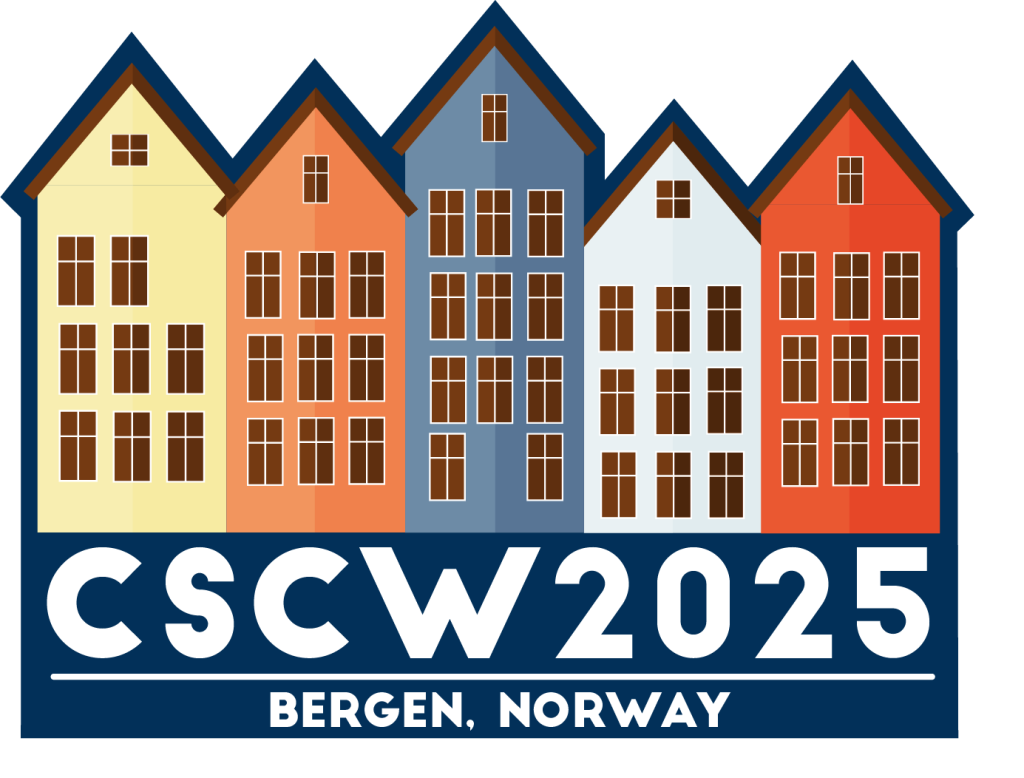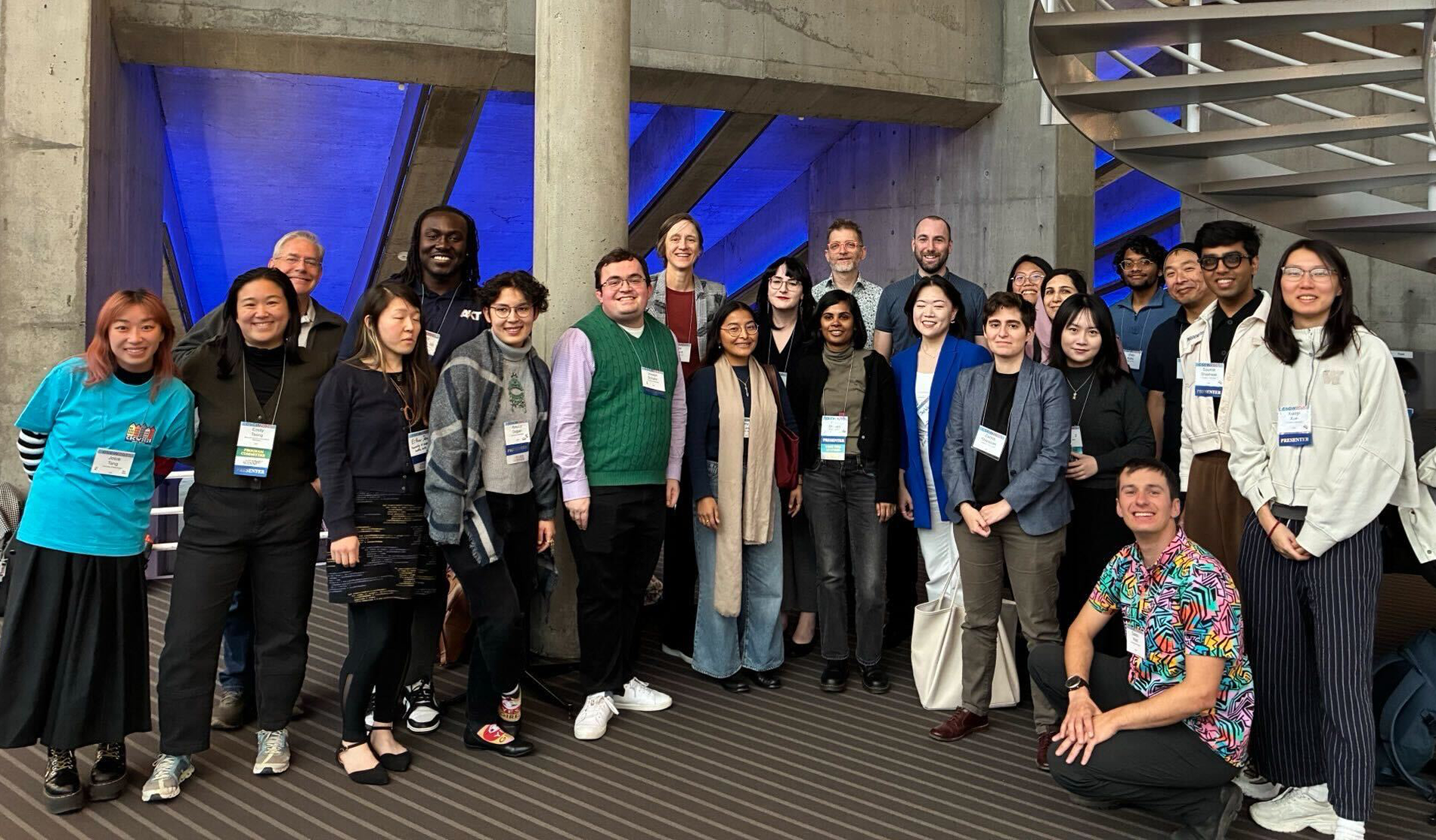Leah Pistorius
October 20, 2025
The Department of Human Centered Design & Engineering celebrates multiple faculty and student researchers recognized at the ACM Conference on Computer-Supported Cooperative Work and Social Computing (CSCW 2025), held October 18–22 in Bergen, Norway.
University of Washington researchers gather for a photo at the CSCW conference on October 20, 2025.
The ACM CSCW conference is one of the world’s premier venues for research on the design, use, and implications of technologies that support collaboration and social interaction. CSCW brings together scholars and practitioners from fields such as human-computer interaction, sociology, communication, psychology, and organizational studies to examine how people work, learn, and connect through technology.
HCDE faculty and students participate in CSCW through publishing research papers, organizing workshops, and volunteering, contributing to international conversations about the future of technology and community action.
2025 CSCW Awards and Recognitions
Abstract
Along with other visual content, data visualizations are increasingly used within participatory online discourse. Though often considered to be “objective”, data visualizations can also be created and/or appropriated to a variety of roles in online discussions. Here, we study the use and evolution of data visualizations within social media discourse. Through computationally-assisted qualitative analysis, we first describe how data visualizations are used to support different rhetorical frames, highlighting key tactics and sources of these visualizations. Next, we conduct a deep analysis of three Data Visualization Lineages (DVLs), exploring the role of adaptations, annotations, and remixing within families of data visualizations that share the same origin but have diverged through distinct visual alterations. We conclude by discussing approaches for supporting researchers in identifying and unpacking data visualization lineages, and highlighting design opportunities for promoting healthy online discourse.
Abstract
Community-collaborative approaches (CCA) have been proposed as more equitable ways to engage communities in research, as they urge researchers to commit to long-term relationships with community members than with other participatory methods. However, the normative structures of HCI and computing research can present challenges in pursuing CCA for the researchers and community partners involved. This paper offers insights into: i) how research and relation impact each other, and ii) how we can conceptualize research as a mode of relation. We present our findings from eighteen semi-structured interviews with community-collaborative researchers in computing and HCI. We then ground our paper in theories of relation and relationality from Caribbean thought, Black studies, and Indigenous scholarship to apply a conceptual framework of relation to our findings. Through this work, we aim to interrogate what it means to center relationality in CCA, beyond and within the development of scientific research.
Abstract
In this paper, we seek to understand how grassroots activists, operating within the hegemony of data-centrism, are often disempowered by data even as they appropriate it towards their own ends. We posit that the shift towards data-driven governance and organizing, by elevating a particular epistemology, can pave over other ways of knowing that are central to social movement practices. Building on Muravyov's [94] concept of “epistemological ambiguity,” we demonstrate how data-focused activism requires complex navigations between data-based epistemologies and the heterogeneous, experiential, and relational epistemologies that characterize social movements. Through three case studies (two drawn from existing literature and the third being an original analysis), we provide an analytical model of how generative epistemological refusals can support more value-aligned navigations of epistemological ambiguity that resist data-centrism. Finally, we suggest how these findings can inform pedagogy, research, and technology design to support communities navigating datafied political arenas.
Abstract
Researchers increasingly look to understand experiences of pain, harm, and marginalization via qualitative analysis. Such work is needed to understand and address social ills, but poses risks to researchers' well-being: sifting through volumes of data on painful human experiences risks incurring traumatic exposure in the researcher. In this paper, we explore how the principles of trauma-informed computing (TIC) can be applied to reimagine healthier tools and workflows for qualitative analysis. We apply TIC to create a design provocation called TIQA, a system for qualitative coding that leverages language modeling, semantic search, and recommendation systems to measure and mitigate an analyst’s exposure to concepts they find traumatic. Through a formative study of TIQA with 15 participants, we illuminate the complexities of enacting TIC in qualitative knowledge infrastructure, and potential roles for machine assistance in mitigating researchers' trauma. To assist scholars in translating the high-level principles of TIC into sociotechnical system design, we argue for: (a) a conceptual shift from safety as exposure reduction towards safety as enablement; and (b) renewed attention to evaluating the trauma-informedness of design processes, in tandem with the outcomes of designed objects on users' well-being.
Abstract
AI-supported writing technologies (AISWT) that provide grammatical suggestions, autocomplete sentences, or generate and rewrite text are now a regular feature integrated into many people's workflows. However, little is known about how people perceive the suggestions these tools provide. In this paper, we investigate how Black American users perceive AISWT, motivated by prior findings in natural language processing that highlight how the underlying large language models can contain racial biases. Using interviews and observational user studies with 13 Black American users of AISWT, we found a strong tradeoff between the perceived benefits of using AISWT to enhance their writing style and feeling like ``it wasn't built for us''. Specifically, participants reported AISWT's failure to recognize commonly used names and expressions in African American Vernacular English, experiencing its corrections as hurtful and alienating and fearing it might further minoritize their culture. We end with a reflection on the tension between AISWT that fail to include Black American culture and language, and AISWT that attempt to mimic it, with attention to accuracy, authenticity, and the production of social difference.

